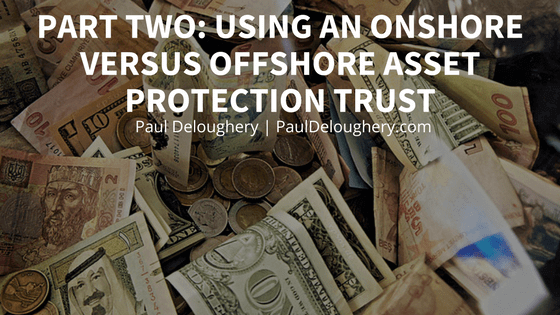In the last blog post, I mentioned that moving your assets out of the U.S. (for a U.S. citizen) to a trust under Cooks Islands law gives you enormous leverage.
So how do you get over the hurdle that most people don’t want to send their assets to a strange trust company in the strange country like the Cook Islands? The answer in the past has been to name a Cook Islands trust company as the successor trustee (not as the current trustee). The trust document then states that if there is an event of duress, such as a lawsuit, bankruptcy or other threat to the beneficiary’s wealth, the beneficiary can resign as trustee and the offshore Cook Islands trust company will automatically become the new trustee. I call this type of trust a Gate Trust (because the creator of the trust can maintain control by being trustee until he/she needs to “close the gate to the castle” and appoint an offshore trustee).
I compare naming an offshore successor trustee of your asset protection trust to a country having nuclear weapons. There’s a reason that rogue countries like Iran and North Korea are trying to get nuclear weapons. It will give them huge bargaining power that they don’t have at the moment. However, using nuclear weapons is not something to be taken lightly. From a practical standpoint, a country is best defended by a conventional military using conventional weapons. That’s why a country like the U.S. has both conventional weapons and nuclear weapons. The conventional weapons can actually be used if needed, and the nuclear weapons are there as a threat.
Coming back to the topic of asset protection trusts, the “conventional weapon” of the trust would be to name the trust as either (a) you (the person creating the trust) or (b) a domestic, U.S.-based trust company in one of the asset protection states such as Delaware, Nevada, South Dakota or Alaska. The “nuclear option” would be to name a trust company in the Cooks Islands as the trustee.
Why do I call the offshore trustee the “nuclear option?” It’s because it’s hard to unring that bell once you’ve taken that step. The trustee fees can be more expensive, and your filing requirements (as a U.S. citizen) are more complicated.
Recent legislation in the Cook Islands makes the trust companies there less willing to even be named as a successor trustee without doing initial due diligence on the beneficiary of the trust. At the time of writing this blog, the trust companies in the Cook Islands that I have recently spoken with want to charge a couple thousand dollars to do a background check on the beneficiary before even being willing to be named as the successor trustee. In the big picture, however, this is still the best approach for someone who really wants to be able to have the option of taking his or her chips off the table if they would otherwise be lost to a frivolous lawsuit. The one downside to moving one’s life savings to an offshore trust company is that that company will charge currently around $4,000 or $5,000 per year to administer the trust and deal with the reporting requirements to the IRS. (The concern on the part of the American government is that people are either trying to avoid taxes or are hiding illegally obtained money.) Another concern is what happens if an officer at the trust company “goes rogue” like Bernie Madoff? I don’t have a good answer for that at the moment, other than to choose a larger trust company with checks and balances.
If you are a U.S. citizen who wants to open a foreign bank account, one way would be to have a foreign trust that owns a foreign limited liability company (such as a Belize or Nevis LLC). Due to U.S. compliance rules imposed on non-U.S. banks, foreign banks are willing to open a bank account in the name of a foreign, non-U.S. LLC (even if owned by a trust whose beneficiary is a U.S. citizen) but are usually not willing to open a bank account in the name of the U.S. citizen.
WARNING: Proper asset protection planning is more complicated than simply forming an asset protection trust. You should NOT play around in this area. Good asset protection attorneys are expensive, but it is worth what you pay them. In future posts, I will discuss more of the details to good asset protection planning, including the use of insurance and business entities, as well as just following good business practice (if you are a business owner). Nothing I have written is intended as legal advice or forming an attorney-client relationship. Feel free to contact me if you want assistance with asset protection planning. However, do not send me any confidential information until I have conducted a conflict check and we have signed an agreement entering into an attorney-client relationship.
Feel free to contact Paul Deloughery at 602-443-4888 if you have any questions. Mr. Deloughery is admitted to practice law in Arizona.
Paul Deloughery is an estate and probate litigation, and law insurance dispute consultant in Scottsdale, Arizona. Visit his website to read more of his blogs or follow him on Twitter!

